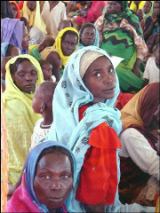Sudan handles Darfur issue in cautious way
KHARTOUM, Dec 22, 2004 (Xinhua) — Sudan, the largest African country, was vaulted into the international limelight in early 2004 by the devastating conflict in its western desert region of Darfur.
 To fend off world threat of sanctions, the Sudanese government has been handling the issue cautiously throughout the year and its efforts seemed successful.
To fend off world threat of sanctions, the Sudanese government has been handling the issue cautiously throughout the year and its efforts seemed successful.
The last few months witnessed a gradual calmness in the international pressure against Khartoum despite the fact that the area still remains volatile.
Darfur has been embroiled in conflict since February 2003 when two rebel groups, namely the Sudan People’s Liberation Army and the Justice and Equality Movement, took up arms against the government for autonomy, accusing Khartoum of marginalization.
The two sides signed a ceasefire accord on April 8 in the Chadian capital of Ndjamena, but both sides resumed hostilities shortly after that, as African Union (AU) observers confirmed.
On July 30, the UN Security Council adopted US-initiated Resolution 1556 on the Darfur conflict, giving the Sudanese government 30 days to disarm all militia and restore law and order in Darfur.
The Security Council said it would consider penalties such as sanctions if the Sudanese government fails to comply with the resolution.
Khartoum was defiant at first, but turned resigned later. Political analysts said the sudden change came out of Sudan’s deliberation that it is better to avoid any direct confrontation with the United States.
To appease international criticism, the Sudanese government signed with UN envoy Jan Pronk on Aug. 4 the so-called Darfur action plan which outlines steps to improve security in Darfur and ease the humanitarin crisis there.
In an important step toward realizing peace in Darfur, the Sudanese government on Nov. 9 signed the humanitarian and security protocols with the Darfur rebel groups in Abuja, Nigeria.
In another development, Khartoum accepted an AU demand to deploy observers in Darfur to supervise the conflicting sides’ commitment to the shaky ceasefire agreement signed in April.
The government also agreed to cooperate with a UN fact-finding committee which was formed by UN Secretary General Kofi Annan, who visited Sudan in early November.
Along with the progress on the level of diplomacy, the Sudanese government has also been trying its best to restablish security in Darfur through spreading thousands of police forces and implementing voluntary return for the displaced people in Darfur.
To reward Khartoum’s cooperation, the Security Council held a special session in the Kenyan capital of Nairobi on Nov. 18-19, the first time in 14 years it convened outside of its headquarters in New York. The council passed a resolution promising international aid to Khartoum once a final and comprehensive agreement is signed between the Sudanese government and militia groups in the south of the country and called for an immediate end to the fighting in Darfur.
The Sudanese delegation was satisfied with the result, saying Resolution 1574, the fourth resolution issued by the UNSC on Darfur issue during six months, “is more balanced”.
“Most of the council’s members have now confessed that imposing sanctions on Sudan will not help realize peace in Sudan,” said Sayid el-Khatib, spokesman of the delegation.
As the year draws to a close, the Sudanese government and Darfur’s rebels have failed to reach a political solution and peace talks in Abuja have been suspended until January.
According to the AU, both sides are committed to respect the ceasefire deal signed in April and call on AU observers to step up their mission to monitor the frontlines.
The 22-month Darfur conflict has killed more than 10,000 people and driven some 1 million others from the region to neighboring countries.
